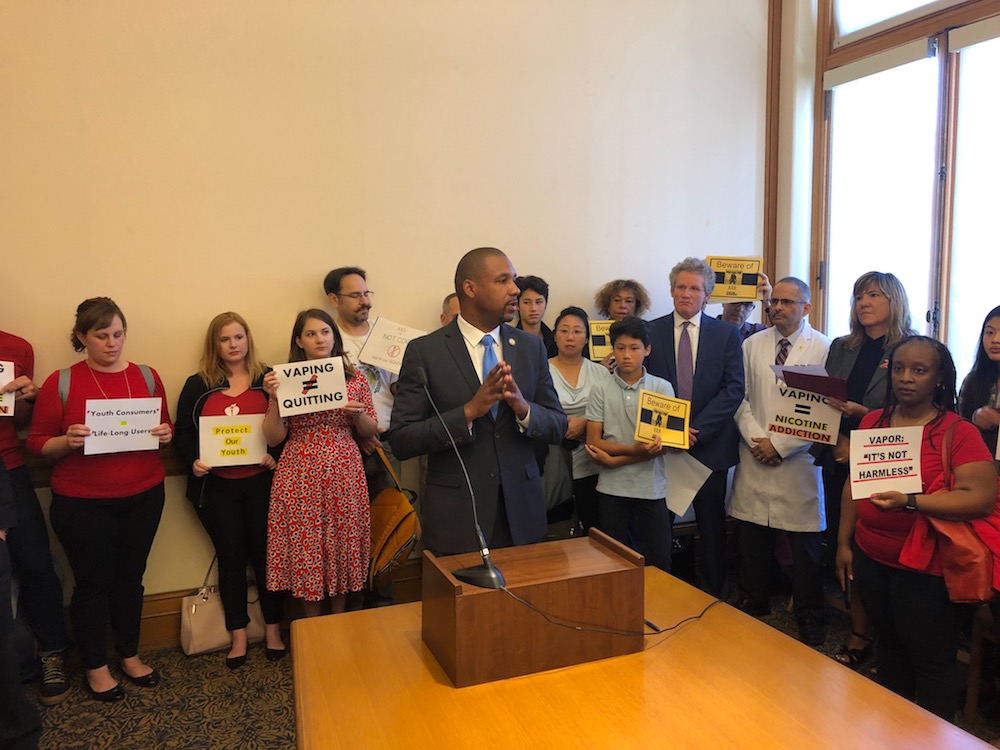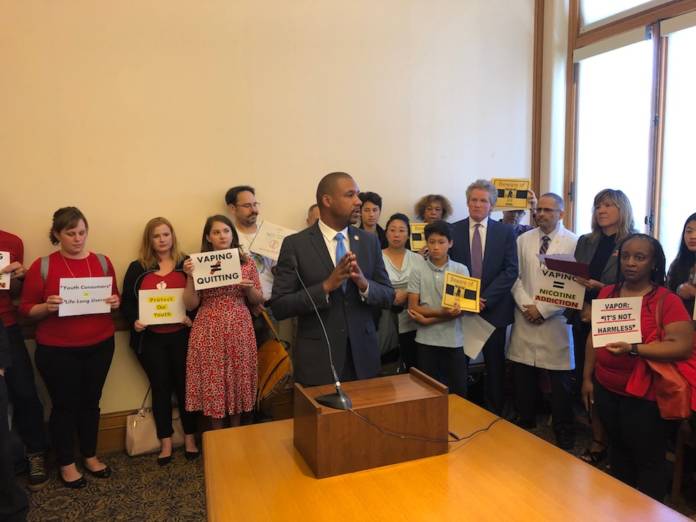Juul failed today in its effort to get the city to change substantially the language that will describe the company’s initiative in the November ballot handbook.
The Ballot Simplification Committee rejected a request from Juul Labs to refer to their nicotine devices as “vapor products” rather than “electronic cigarettes.”
That request was just one of 12 changes Juul asked the committee to make when it heard appeals on Friday to the draft summaries the committee labored to produce this week, during meetings that were at times extremely contentious.

The committee ultimately chose to ignore most of Juul’s requests to modify the language summarizing the Juul-backed ballot initiative. The measure would reverse a city law, sponsored by Sup. Shamman Walton and passed unanimously by the supes in June, to ban Juul’s devices from being manufactured or sold in San Francisco starting in 2020, unless the devices undergo an FDA review. So far, Juul has not applied for that FDA review process.
The committee also decided to leave in place language from the City Attorney’s Office stating Juul’s ballot measure may have the effect of overturning the city’s ban on flavored tobacco, which was passed by the supes and ratified by voters in the June 2018 election.
Parker Kasmer, an attorney for Juul, told the committee the company’s intent was never to overturn the flavor ban, and that they don’t believe the initiative would have that effect. But others have raised questions about what the outcome may be, which ultimately may need to be decided in court if the measure passes.
Because of the legal uncertainty, the committee felt it was important to leave the language in place.
Kasmer said that if the voter digest included that language, it could turn into a weird kind of self-fulfilling prophecy by changing what courts could view as the legislative intent of the initiative.
The committee didn’t buy that argument, and even questioned if its role as a government body was to determine voter intent.
“I got to be honest, I only understood a very small portion of what you were arguing,” committee member Ashley Raveche said. “I can’t look to the future and be scared about what will come out of this initiative for you. That’s not the purpose of this committee.”
“All we’re saying here is that it may repeal city laws,” said committee Chair Betty Packard. “I don’t think that would be interpreted as voter intent.”
Outside the hearing room, representatives from Juul seemed frustrated with the committee.
“They seem to not grasp the importance of the digest they produce,” said Nick Sanders, an attorney for the Coalition for Reasonable Vaping Regulation – the organization sponsored by Juul to introduce the ballot measure. “Parker called it voter intent to them, and they kind of made fun of him. They teased him a little bit, and they didn’t get to the meat of the matter, which is that that document – what they produced – is now what a court will see as the legislative intent of the bill.”
Sanders said he didn’t believe a court challenge to the flavor ban would be effective if the measure passed, but the language included in the ballot summary would make the case more complicated.
“Before, it would have been thrown out of court without even a second thought. Now, there’s an argument where there was none,” he said.
Opponents of the measure said the entire argument was part of a political strategy. “This is just the first step of Juul’s effort to trick San Francisco voters into thinking that this measure will restrict vaping, when what it would do is rollback San Francisco’s very strong laws on flavored tobacco,” said Jim Knox, vice president of the American Cancer Society.
“Who are you going to believe?” Knox asked. “Do you want Juul – who created the vaping epidemic in the country, and is addicting a whole new generation of kids to nicotine – to be writing the regulations for how e-cigarettes should be regulated in California? Or do you want the Board of Supervisors and the voters to do it? It’s really that simple.”
Under San Francisco election law, Juul has until 74 days before the election – which this year falls on Aug. 23 – to file a possible legal challenge. Sanders said the decision would be up to his client, but that “litigation is on the table.”
Not all of the requests the committee rejected were such hot button issues. They also declined to add language calling the equipment retail stores would be required to use to verify customers are at least 21-years-old “enhanced verification techniques” – which to me only served to bring up memories of the legalese euphuisms the Bush administration used for waterboarding.
The committee may have done Juul a favor with that one.





